Contemporary Business and Management Report: Mercedes Benz Case Study
VerifiedAdded on 2021/01/02
|19
|5172
|121
Report
AI Summary
This report provides a comprehensive analysis of Mercedes Benz, a multinational automotive corporation. It begins with an executive summary and company profile, then delves into the primary external influences on the business using a PESTLE analysis, examining political, economic, social, technological, environmental, and legal factors. The report then explores cultural and organizational change within Mercedes Benz, discussing the relevance of cultural change, its influence on policies, and the effectiveness of the organization's responses. The report highlights areas for improvement and concludes with a summary of key findings, offering insights into Mercedes Benz's strategies and adaptation to contemporary business developments. The report also analyzes how the company's culture, particularly its power culture, impacts decision-making and organizational change, emphasizing the importance of understanding external pressures and internal dynamics for sustained success in the automotive industry.
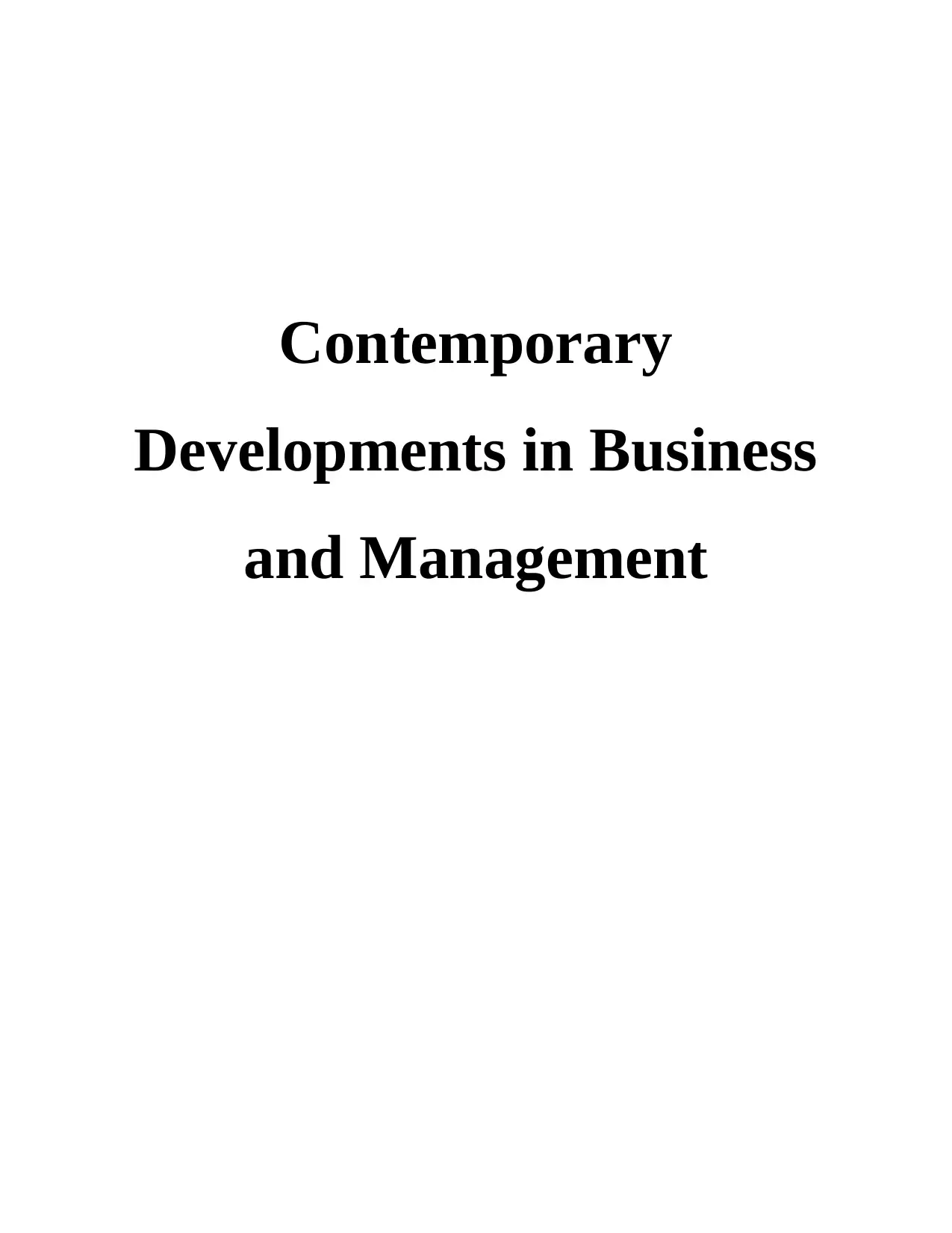
Contemporary
Developments in Business
and Management
Developments in Business
and Management
Paraphrase This Document
Need a fresh take? Get an instant paraphrase of this document with our AI Paraphraser
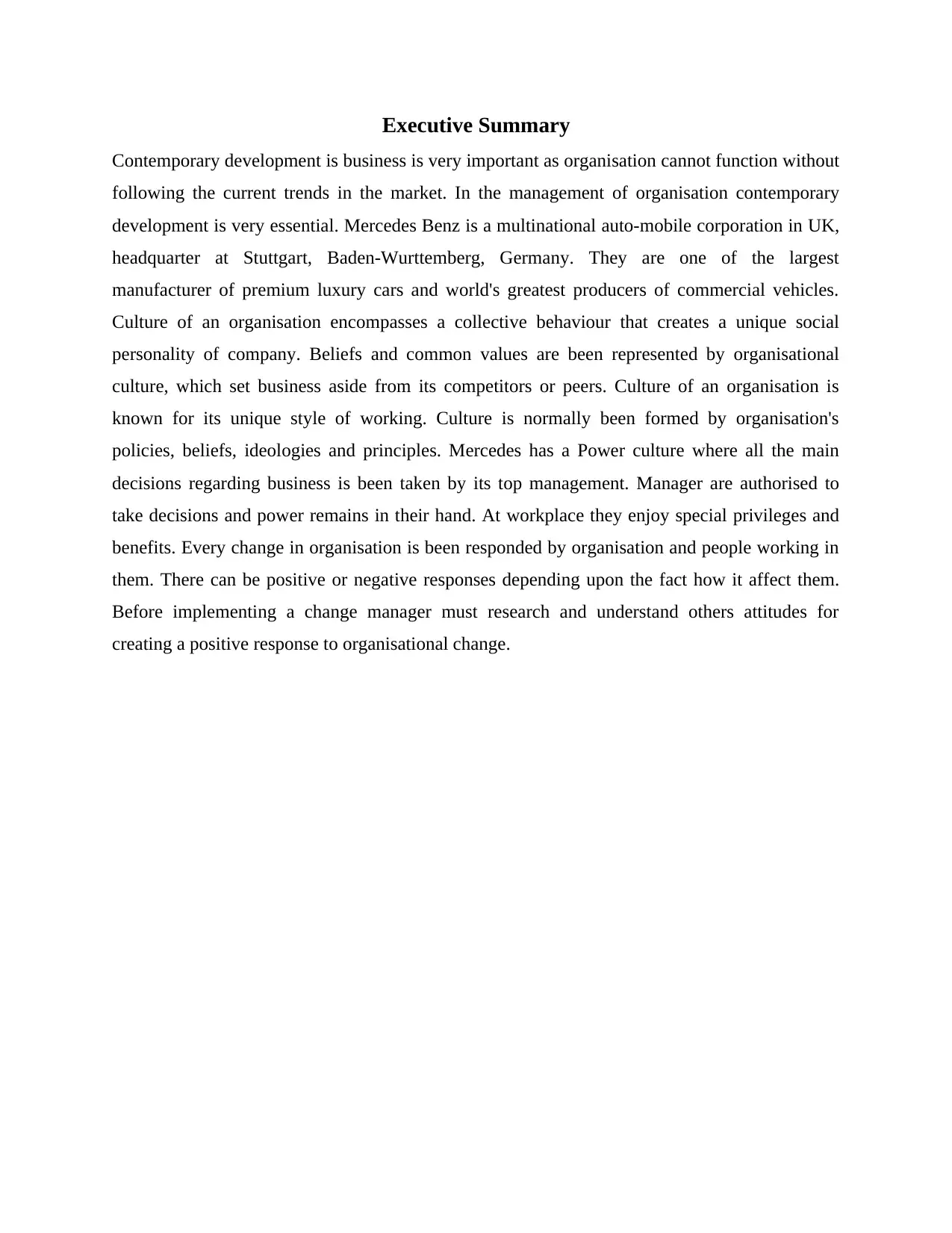
Executive Summary
Contemporary development is business is very important as organisation cannot function without
following the current trends in the market. In the management of organisation contemporary
development is very essential. Mercedes Benz is a multinational auto-mobile corporation in UK,
headquarter at Stuttgart, Baden-Wurttemberg, Germany. They are one of the largest
manufacturer of premium luxury cars and world's greatest producers of commercial vehicles.
Culture of an organisation encompasses a collective behaviour that creates a unique social
personality of company. Beliefs and common values are been represented by organisational
culture, which set business aside from its competitors or peers. Culture of an organisation is
known for its unique style of working. Culture is normally been formed by organisation's
policies, beliefs, ideologies and principles. Mercedes has a Power culture where all the main
decisions regarding business is been taken by its top management. Manager are authorised to
take decisions and power remains in their hand. At workplace they enjoy special privileges and
benefits. Every change in organisation is been responded by organisation and people working in
them. There can be positive or negative responses depending upon the fact how it affect them.
Before implementing a change manager must research and understand others attitudes for
creating a positive response to organisational change.
Contemporary development is business is very important as organisation cannot function without
following the current trends in the market. In the management of organisation contemporary
development is very essential. Mercedes Benz is a multinational auto-mobile corporation in UK,
headquarter at Stuttgart, Baden-Wurttemberg, Germany. They are one of the largest
manufacturer of premium luxury cars and world's greatest producers of commercial vehicles.
Culture of an organisation encompasses a collective behaviour that creates a unique social
personality of company. Beliefs and common values are been represented by organisational
culture, which set business aside from its competitors or peers. Culture of an organisation is
known for its unique style of working. Culture is normally been formed by organisation's
policies, beliefs, ideologies and principles. Mercedes has a Power culture where all the main
decisions regarding business is been taken by its top management. Manager are authorised to
take decisions and power remains in their hand. At workplace they enjoy special privileges and
benefits. Every change in organisation is been responded by organisation and people working in
them. There can be positive or negative responses depending upon the fact how it affect them.
Before implementing a change manager must research and understand others attitudes for
creating a positive response to organisational change.
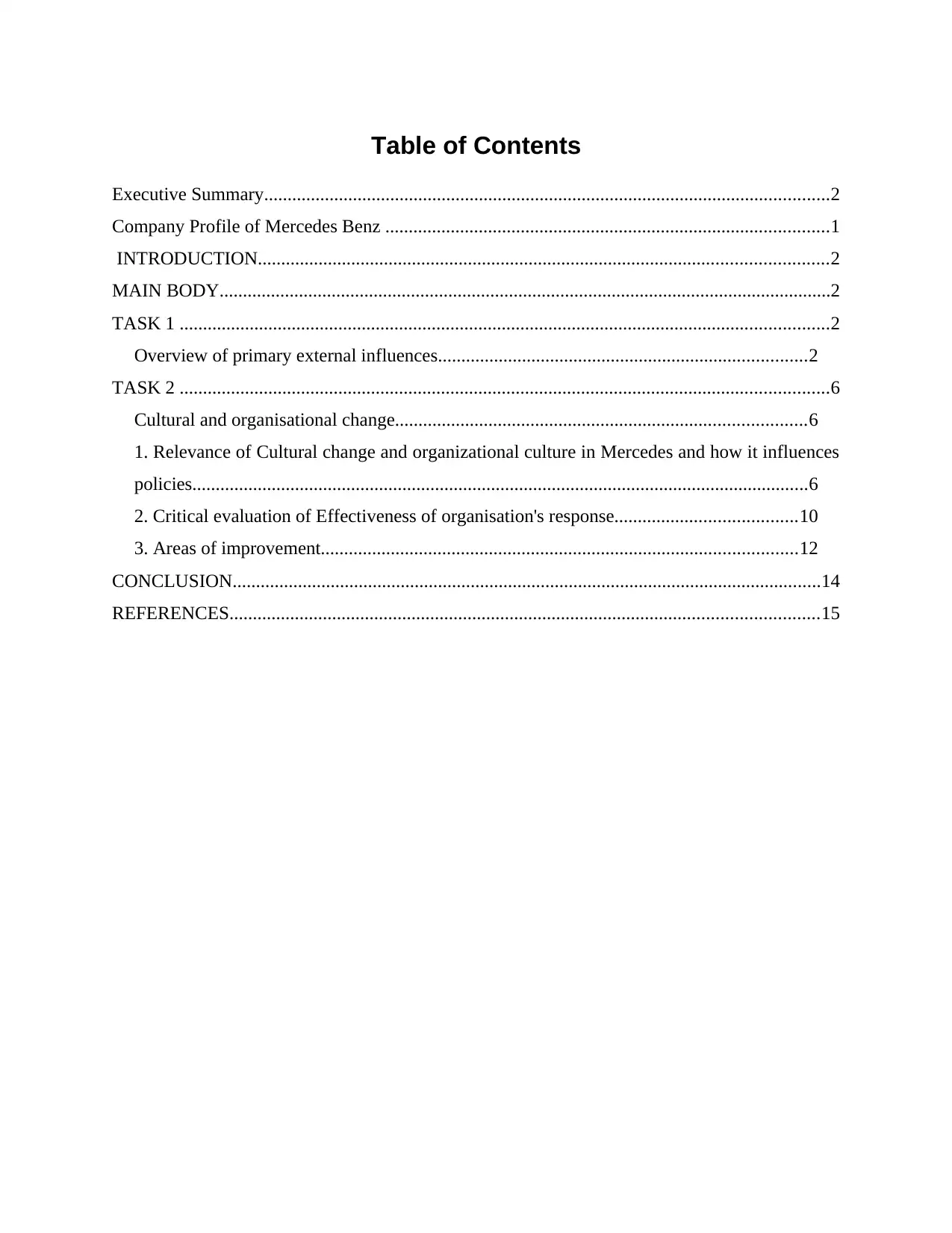
Table of Contents
Executive Summary.........................................................................................................................2
Company Profile of Mercedes Benz ...............................................................................................1
INTRODUCTION..........................................................................................................................2
MAIN BODY...................................................................................................................................2
TASK 1 ...........................................................................................................................................2
Overview of primary external influences...............................................................................2
TASK 2 ...........................................................................................................................................6
Cultural and organisational change........................................................................................6
1. Relevance of Cultural change and organizational culture in Mercedes and how it influences
policies....................................................................................................................................6
2. Critical evaluation of Effectiveness of organisation's response.......................................10
3. Areas of improvement......................................................................................................12
CONCLUSION..............................................................................................................................14
REFERENCES..............................................................................................................................15
Executive Summary.........................................................................................................................2
Company Profile of Mercedes Benz ...............................................................................................1
INTRODUCTION..........................................................................................................................2
MAIN BODY...................................................................................................................................2
TASK 1 ...........................................................................................................................................2
Overview of primary external influences...............................................................................2
TASK 2 ...........................................................................................................................................6
Cultural and organisational change........................................................................................6
1. Relevance of Cultural change and organizational culture in Mercedes and how it influences
policies....................................................................................................................................6
2. Critical evaluation of Effectiveness of organisation's response.......................................10
3. Areas of improvement......................................................................................................12
CONCLUSION..............................................................................................................................14
REFERENCES..............................................................................................................................15
⊘ This is a preview!⊘
Do you want full access?
Subscribe today to unlock all pages.

Trusted by 1+ million students worldwide
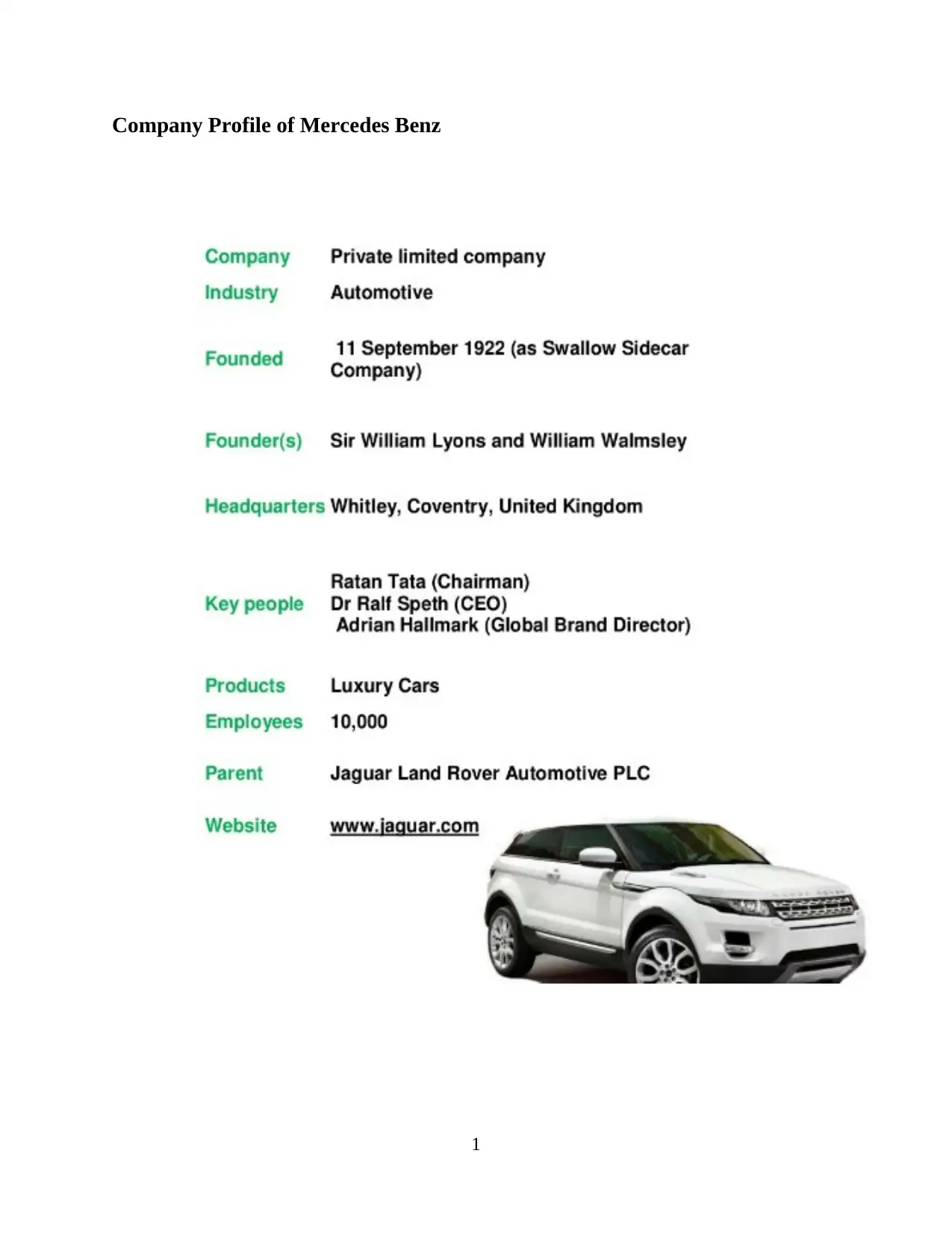
Company Profile of Mercedes Benz
1
1
Paraphrase This Document
Need a fresh take? Get an instant paraphrase of this document with our AI Paraphraser
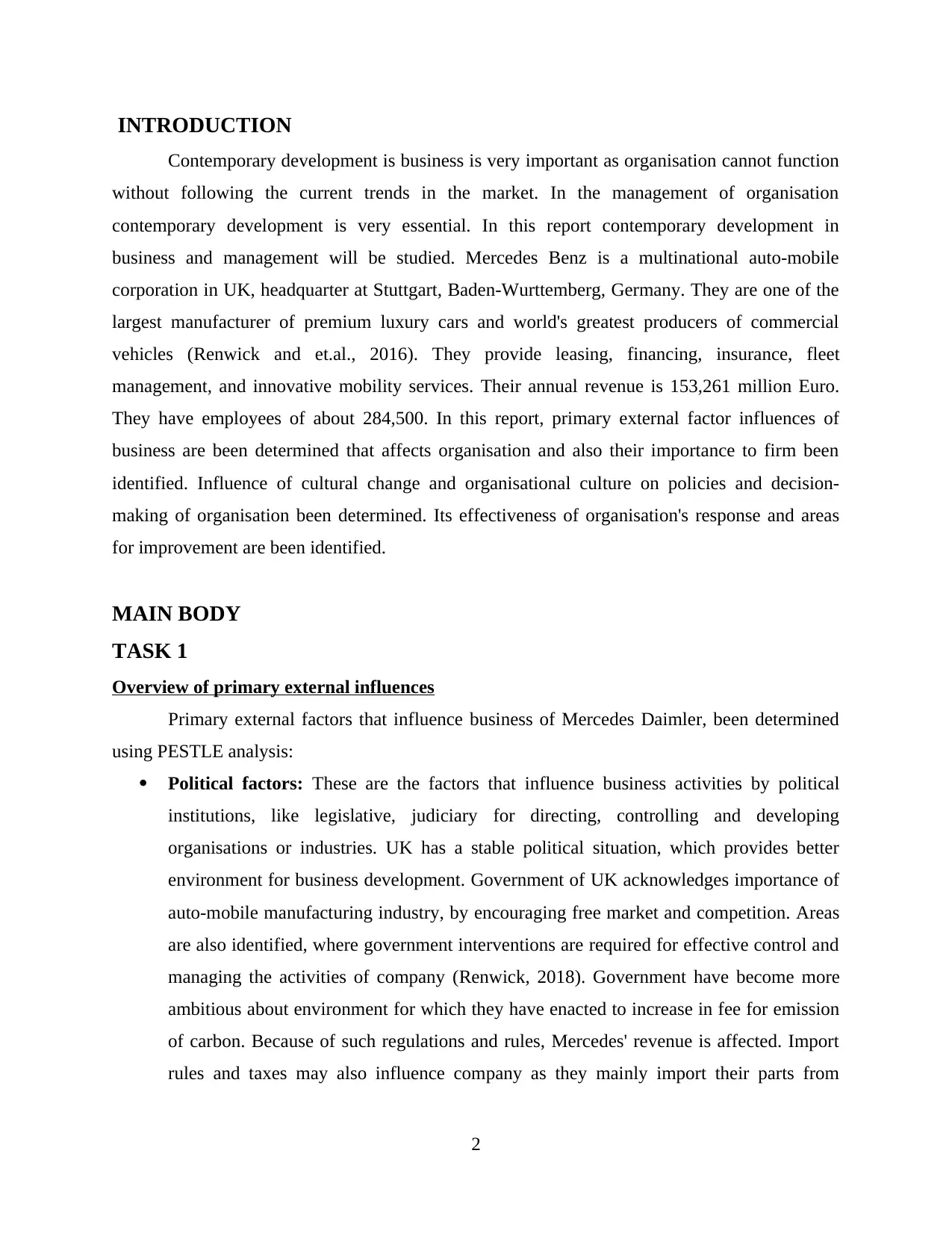
INTRODUCTION
Contemporary development is business is very important as organisation cannot function
without following the current trends in the market. In the management of organisation
contemporary development is very essential. In this report contemporary development in
business and management will be studied. Mercedes Benz is a multinational auto-mobile
corporation in UK, headquarter at Stuttgart, Baden-Wurttemberg, Germany. They are one of the
largest manufacturer of premium luxury cars and world's greatest producers of commercial
vehicles (Renwick and et.al., 2016). They provide leasing, financing, insurance, fleet
management, and innovative mobility services. Their annual revenue is 153,261 million Euro.
They have employees of about 284,500. In this report, primary external factor influences of
business are been determined that affects organisation and also their importance to firm been
identified. Influence of cultural change and organisational culture on policies and decision-
making of organisation been determined. Its effectiveness of organisation's response and areas
for improvement are been identified.
MAIN BODY
TASK 1
Overview of primary external influences
Primary external factors that influence business of Mercedes Daimler, been determined
using PESTLE analysis:
Political factors: These are the factors that influence business activities by political
institutions, like legislative, judiciary for directing, controlling and developing
organisations or industries. UK has a stable political situation, which provides better
environment for business development. Government of UK acknowledges importance of
auto-mobile manufacturing industry, by encouraging free market and competition. Areas
are also identified, where government interventions are required for effective control and
managing the activities of company (Renwick, 2018). Government have become more
ambitious about environment for which they have enacted to increase in fee for emission
of carbon. Because of such regulations and rules, Mercedes' revenue is affected. Import
rules and taxes may also influence company as they mainly import their parts from
2
Contemporary development is business is very important as organisation cannot function
without following the current trends in the market. In the management of organisation
contemporary development is very essential. In this report contemporary development in
business and management will be studied. Mercedes Benz is a multinational auto-mobile
corporation in UK, headquarter at Stuttgart, Baden-Wurttemberg, Germany. They are one of the
largest manufacturer of premium luxury cars and world's greatest producers of commercial
vehicles (Renwick and et.al., 2016). They provide leasing, financing, insurance, fleet
management, and innovative mobility services. Their annual revenue is 153,261 million Euro.
They have employees of about 284,500. In this report, primary external factor influences of
business are been determined that affects organisation and also their importance to firm been
identified. Influence of cultural change and organisational culture on policies and decision-
making of organisation been determined. Its effectiveness of organisation's response and areas
for improvement are been identified.
MAIN BODY
TASK 1
Overview of primary external influences
Primary external factors that influence business of Mercedes Daimler, been determined
using PESTLE analysis:
Political factors: These are the factors that influence business activities by political
institutions, like legislative, judiciary for directing, controlling and developing
organisations or industries. UK has a stable political situation, which provides better
environment for business development. Government of UK acknowledges importance of
auto-mobile manufacturing industry, by encouraging free market and competition. Areas
are also identified, where government interventions are required for effective control and
managing the activities of company (Renwick, 2018). Government have become more
ambitious about environment for which they have enacted to increase in fee for emission
of carbon. Because of such regulations and rules, Mercedes' revenue is affected. Import
rules and taxes may also influence company as they mainly import their parts from
2
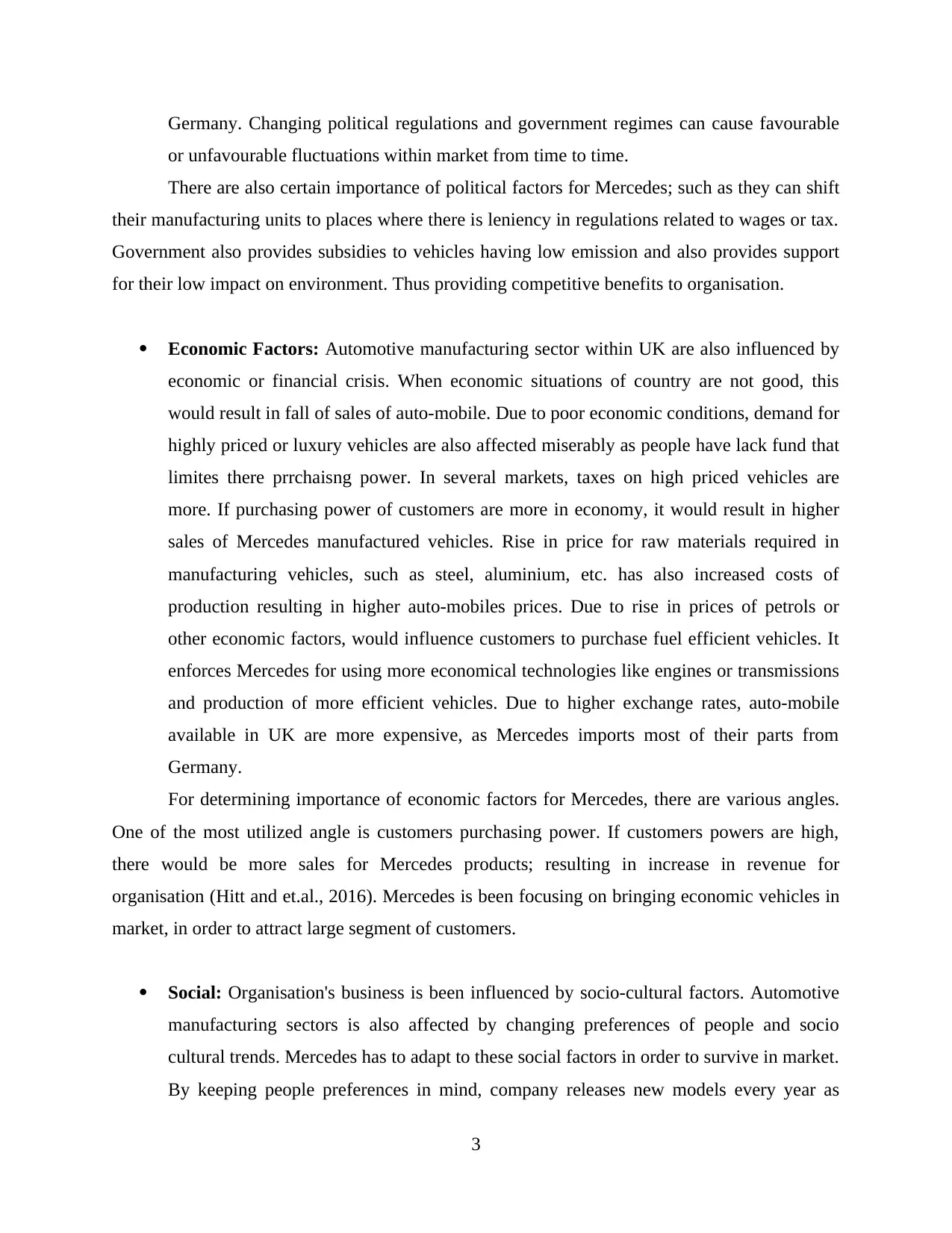
Germany. Changing political regulations and government regimes can cause favourable
or unfavourable fluctuations within market from time to time.
There are also certain importance of political factors for Mercedes; such as they can shift
their manufacturing units to places where there is leniency in regulations related to wages or tax.
Government also provides subsidies to vehicles having low emission and also provides support
for their low impact on environment. Thus providing competitive benefits to organisation.
Economic Factors: Automotive manufacturing sector within UK are also influenced by
economic or financial crisis. When economic situations of country are not good, this
would result in fall of sales of auto-mobile. Due to poor economic conditions, demand for
highly priced or luxury vehicles are also affected miserably as people have lack fund that
limites there prrchaisng power. In several markets, taxes on high priced vehicles are
more. If purchasing power of customers are more in economy, it would result in higher
sales of Mercedes manufactured vehicles. Rise in price for raw materials required in
manufacturing vehicles, such as steel, aluminium, etc. has also increased costs of
production resulting in higher auto-mobiles prices. Due to rise in prices of petrols or
other economic factors, would influence customers to purchase fuel efficient vehicles. It
enforces Mercedes for using more economical technologies like engines or transmissions
and production of more efficient vehicles. Due to higher exchange rates, auto-mobile
available in UK are more expensive, as Mercedes imports most of their parts from
Germany.
For determining importance of economic factors for Mercedes, there are various angles.
One of the most utilized angle is customers purchasing power. If customers powers are high,
there would be more sales for Mercedes products; resulting in increase in revenue for
organisation (Hitt and et.al., 2016). Mercedes is been focusing on bringing economic vehicles in
market, in order to attract large segment of customers.
Social: Organisation's business is been influenced by socio-cultural factors. Automotive
manufacturing sectors is also affected by changing preferences of people and socio
cultural trends. Mercedes has to adapt to these social factors in order to survive in market.
By keeping people preferences in mind, company releases new models every year as
3
or unfavourable fluctuations within market from time to time.
There are also certain importance of political factors for Mercedes; such as they can shift
their manufacturing units to places where there is leniency in regulations related to wages or tax.
Government also provides subsidies to vehicles having low emission and also provides support
for their low impact on environment. Thus providing competitive benefits to organisation.
Economic Factors: Automotive manufacturing sector within UK are also influenced by
economic or financial crisis. When economic situations of country are not good, this
would result in fall of sales of auto-mobile. Due to poor economic conditions, demand for
highly priced or luxury vehicles are also affected miserably as people have lack fund that
limites there prrchaisng power. In several markets, taxes on high priced vehicles are
more. If purchasing power of customers are more in economy, it would result in higher
sales of Mercedes manufactured vehicles. Rise in price for raw materials required in
manufacturing vehicles, such as steel, aluminium, etc. has also increased costs of
production resulting in higher auto-mobiles prices. Due to rise in prices of petrols or
other economic factors, would influence customers to purchase fuel efficient vehicles. It
enforces Mercedes for using more economical technologies like engines or transmissions
and production of more efficient vehicles. Due to higher exchange rates, auto-mobile
available in UK are more expensive, as Mercedes imports most of their parts from
Germany.
For determining importance of economic factors for Mercedes, there are various angles.
One of the most utilized angle is customers purchasing power. If customers powers are high,
there would be more sales for Mercedes products; resulting in increase in revenue for
organisation (Hitt and et.al., 2016). Mercedes is been focusing on bringing economic vehicles in
market, in order to attract large segment of customers.
Social: Organisation's business is been influenced by socio-cultural factors. Automotive
manufacturing sectors is also affected by changing preferences of people and socio
cultural trends. Mercedes has to adapt to these social factors in order to survive in market.
By keeping people preferences in mind, company releases new models every year as
3
⊘ This is a preview!⊘
Do you want full access?
Subscribe today to unlock all pages.

Trusted by 1+ million students worldwide
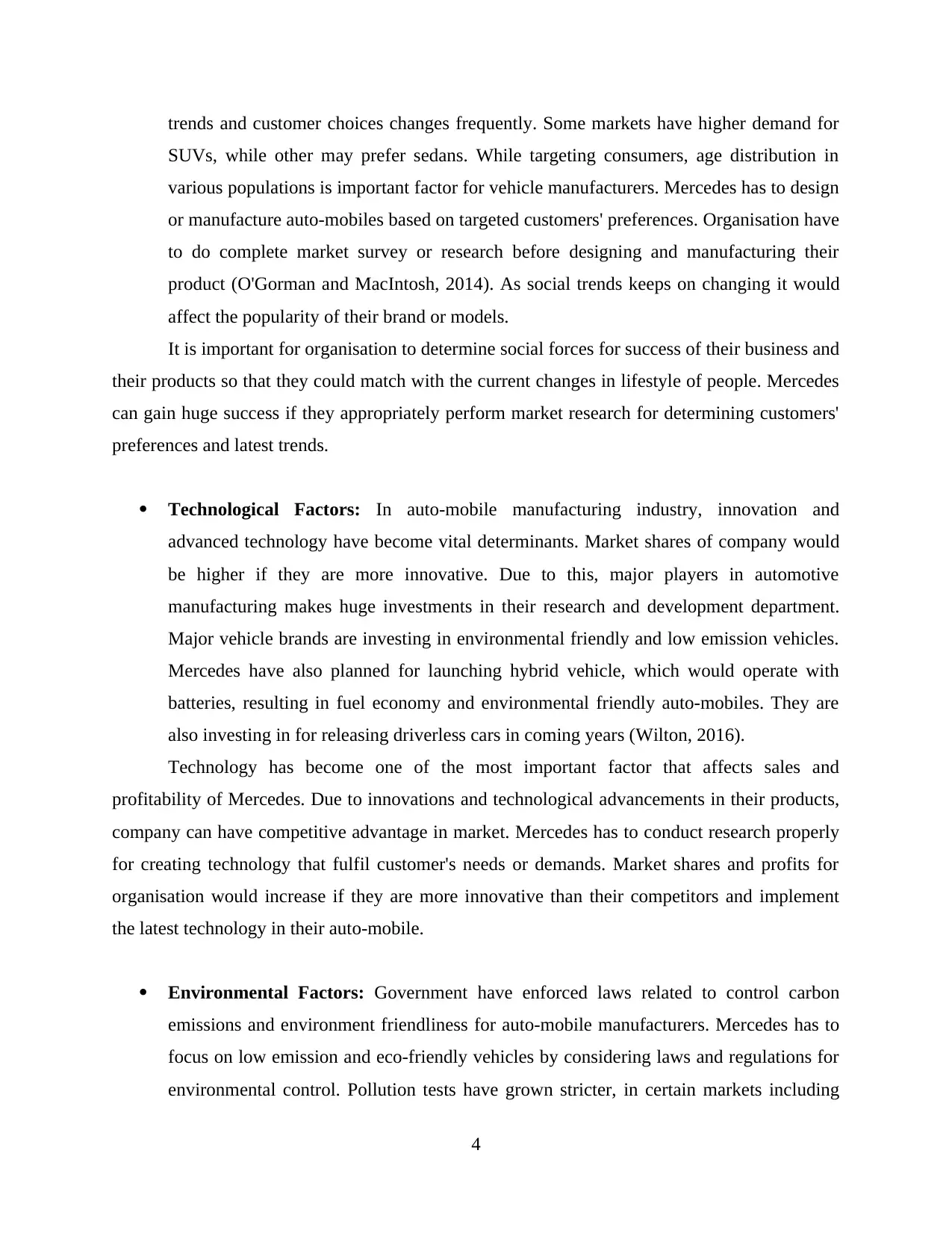
trends and customer choices changes frequently. Some markets have higher demand for
SUVs, while other may prefer sedans. While targeting consumers, age distribution in
various populations is important factor for vehicle manufacturers. Mercedes has to design
or manufacture auto-mobiles based on targeted customers' preferences. Organisation have
to do complete market survey or research before designing and manufacturing their
product (O'Gorman and MacIntosh, 2014). As social trends keeps on changing it would
affect the popularity of their brand or models.
It is important for organisation to determine social forces for success of their business and
their products so that they could match with the current changes in lifestyle of people. Mercedes
can gain huge success if they appropriately perform market research for determining customers'
preferences and latest trends.
Technological Factors: In auto-mobile manufacturing industry, innovation and
advanced technology have become vital determinants. Market shares of company would
be higher if they are more innovative. Due to this, major players in automotive
manufacturing makes huge investments in their research and development department.
Major vehicle brands are investing in environmental friendly and low emission vehicles.
Mercedes have also planned for launching hybrid vehicle, which would operate with
batteries, resulting in fuel economy and environmental friendly auto-mobiles. They are
also investing in for releasing driverless cars in coming years (Wilton, 2016).
Technology has become one of the most important factor that affects sales and
profitability of Mercedes. Due to innovations and technological advancements in their products,
company can have competitive advantage in market. Mercedes has to conduct research properly
for creating technology that fulfil customer's needs or demands. Market shares and profits for
organisation would increase if they are more innovative than their competitors and implement
the latest technology in their auto-mobile.
Environmental Factors: Government have enforced laws related to control carbon
emissions and environment friendliness for auto-mobile manufacturers. Mercedes has to
focus on low emission and eco-friendly vehicles by considering laws and regulations for
environmental control. Pollution tests have grown stricter, in certain markets including
4
SUVs, while other may prefer sedans. While targeting consumers, age distribution in
various populations is important factor for vehicle manufacturers. Mercedes has to design
or manufacture auto-mobiles based on targeted customers' preferences. Organisation have
to do complete market survey or research before designing and manufacturing their
product (O'Gorman and MacIntosh, 2014). As social trends keeps on changing it would
affect the popularity of their brand or models.
It is important for organisation to determine social forces for success of their business and
their products so that they could match with the current changes in lifestyle of people. Mercedes
can gain huge success if they appropriately perform market research for determining customers'
preferences and latest trends.
Technological Factors: In auto-mobile manufacturing industry, innovation and
advanced technology have become vital determinants. Market shares of company would
be higher if they are more innovative. Due to this, major players in automotive
manufacturing makes huge investments in their research and development department.
Major vehicle brands are investing in environmental friendly and low emission vehicles.
Mercedes have also planned for launching hybrid vehicle, which would operate with
batteries, resulting in fuel economy and environmental friendly auto-mobiles. They are
also investing in for releasing driverless cars in coming years (Wilton, 2016).
Technology has become one of the most important factor that affects sales and
profitability of Mercedes. Due to innovations and technological advancements in their products,
company can have competitive advantage in market. Mercedes has to conduct research properly
for creating technology that fulfil customer's needs or demands. Market shares and profits for
organisation would increase if they are more innovative than their competitors and implement
the latest technology in their auto-mobile.
Environmental Factors: Government have enforced laws related to control carbon
emissions and environment friendliness for auto-mobile manufacturers. Mercedes has to
focus on low emission and eco-friendly vehicles by considering laws and regulations for
environmental control. Pollution tests have grown stricter, in certain markets including
4
Paraphrase This Document
Need a fresh take? Get an instant paraphrase of this document with our AI Paraphraser
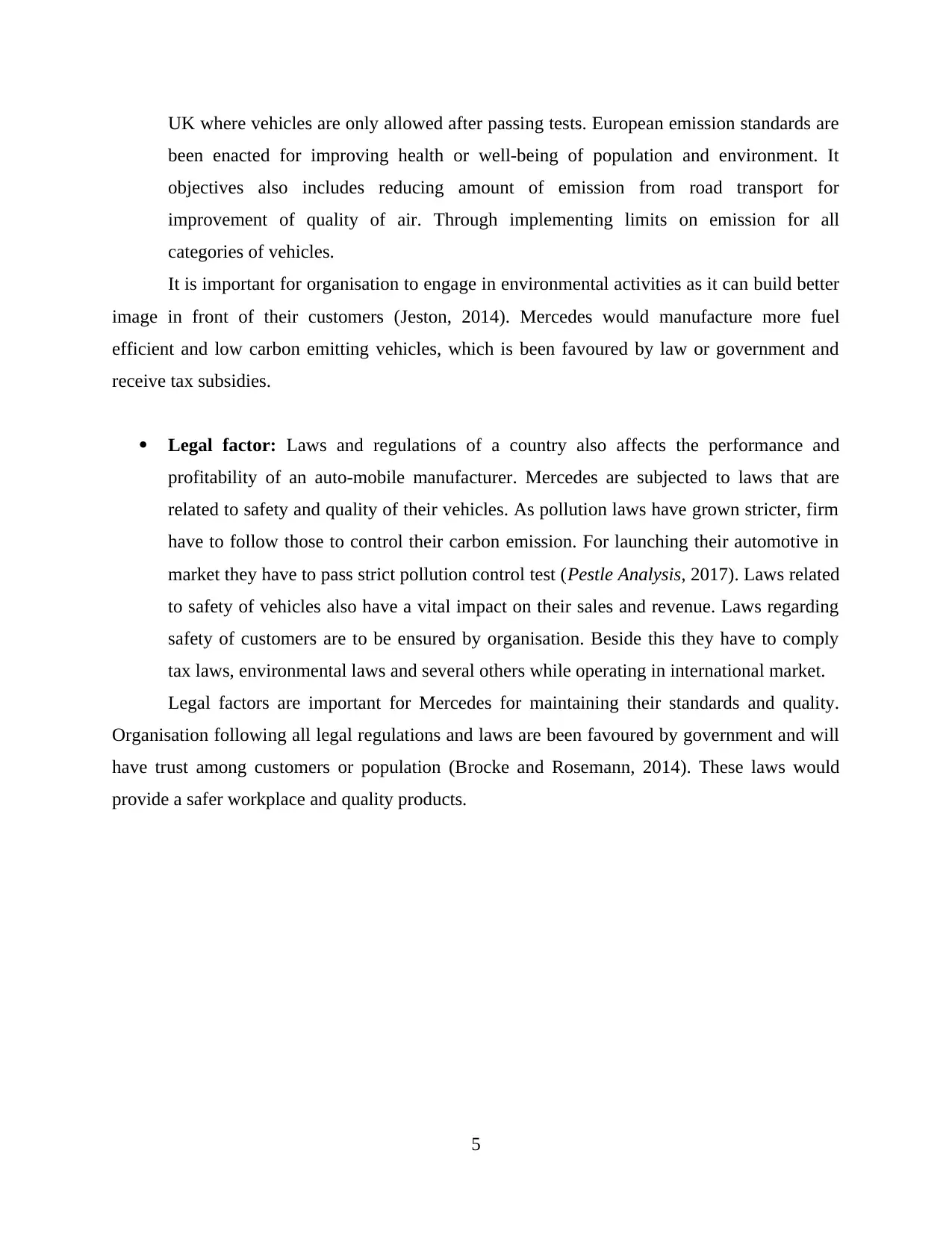
UK where vehicles are only allowed after passing tests. European emission standards are
been enacted for improving health or well-being of population and environment. It
objectives also includes reducing amount of emission from road transport for
improvement of quality of air. Through implementing limits on emission for all
categories of vehicles.
It is important for organisation to engage in environmental activities as it can build better
image in front of their customers (Jeston, 2014). Mercedes would manufacture more fuel
efficient and low carbon emitting vehicles, which is been favoured by law or government and
receive tax subsidies.
Legal factor: Laws and regulations of a country also affects the performance and
profitability of an auto-mobile manufacturer. Mercedes are subjected to laws that are
related to safety and quality of their vehicles. As pollution laws have grown stricter, firm
have to follow those to control their carbon emission. For launching their automotive in
market they have to pass strict pollution control test (Pestle Analysis, 2017). Laws related
to safety of vehicles also have a vital impact on their sales and revenue. Laws regarding
safety of customers are to be ensured by organisation. Beside this they have to comply
tax laws, environmental laws and several others while operating in international market.
Legal factors are important for Mercedes for maintaining their standards and quality.
Organisation following all legal regulations and laws are been favoured by government and will
have trust among customers or population (Brocke and Rosemann, 2014). These laws would
provide a safer workplace and quality products.
5
been enacted for improving health or well-being of population and environment. It
objectives also includes reducing amount of emission from road transport for
improvement of quality of air. Through implementing limits on emission for all
categories of vehicles.
It is important for organisation to engage in environmental activities as it can build better
image in front of their customers (Jeston, 2014). Mercedes would manufacture more fuel
efficient and low carbon emitting vehicles, which is been favoured by law or government and
receive tax subsidies.
Legal factor: Laws and regulations of a country also affects the performance and
profitability of an auto-mobile manufacturer. Mercedes are subjected to laws that are
related to safety and quality of their vehicles. As pollution laws have grown stricter, firm
have to follow those to control their carbon emission. For launching their automotive in
market they have to pass strict pollution control test (Pestle Analysis, 2017). Laws related
to safety of vehicles also have a vital impact on their sales and revenue. Laws regarding
safety of customers are to be ensured by organisation. Beside this they have to comply
tax laws, environmental laws and several others while operating in international market.
Legal factors are important for Mercedes for maintaining their standards and quality.
Organisation following all legal regulations and laws are been favoured by government and will
have trust among customers or population (Brocke and Rosemann, 2014). These laws would
provide a safer workplace and quality products.
5
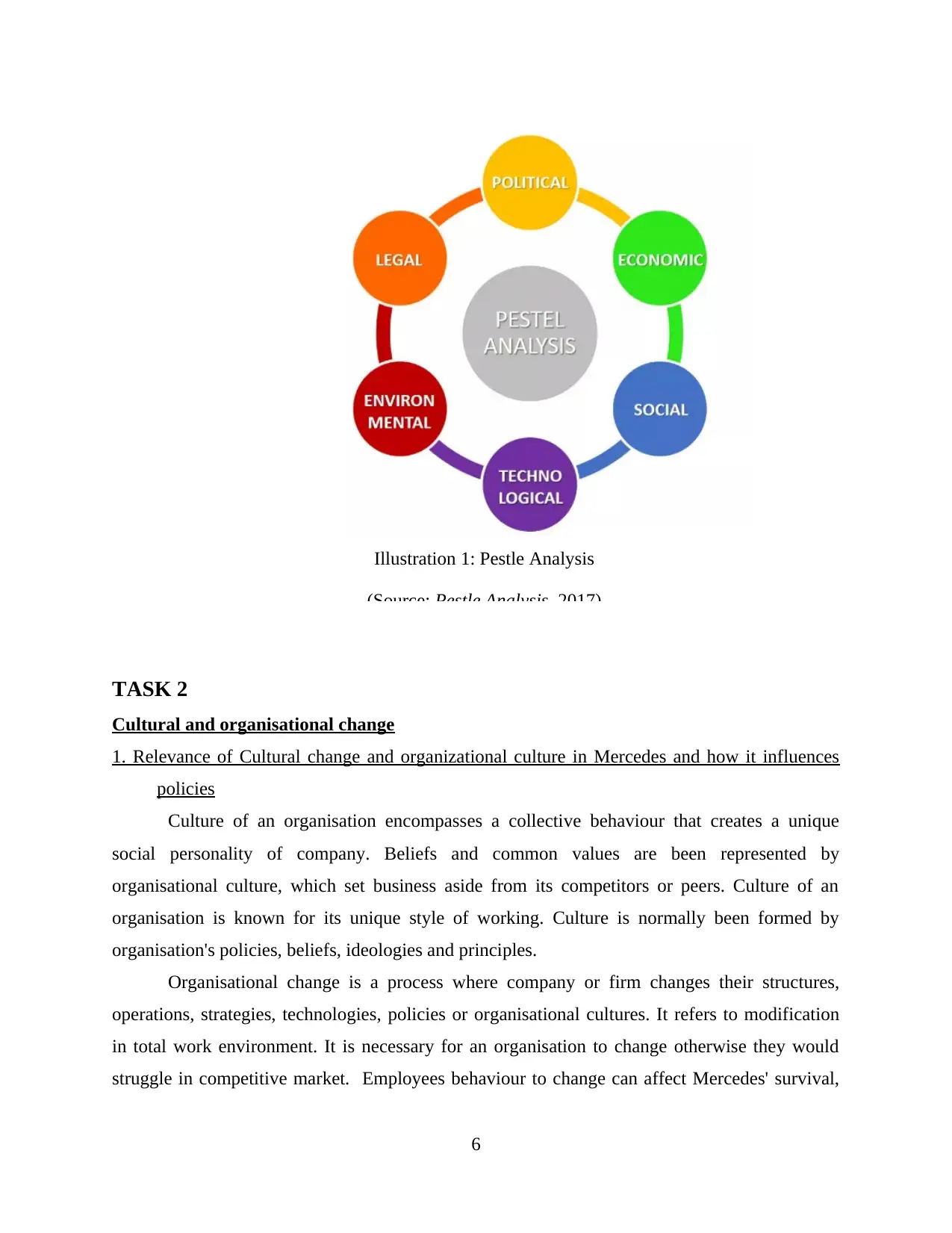
TASK 2
Cultural and organisational change
1. Relevance of Cultural change and organizational culture in Mercedes and how it influences
policies
Culture of an organisation encompasses a collective behaviour that creates a unique
social personality of company. Beliefs and common values are been represented by
organisational culture, which set business aside from its competitors or peers. Culture of an
organisation is known for its unique style of working. Culture is normally been formed by
organisation's policies, beliefs, ideologies and principles.
Organisational change is a process where company or firm changes their structures,
operations, strategies, technologies, policies or organisational cultures. It refers to modification
in total work environment. It is necessary for an organisation to change otherwise they would
struggle in competitive market. Employees behaviour to change can affect Mercedes' survival,
6
Illustration 1: Pestle Analysis
(Source: Pestle Analysis, 2017)
Cultural and organisational change
1. Relevance of Cultural change and organizational culture in Mercedes and how it influences
policies
Culture of an organisation encompasses a collective behaviour that creates a unique
social personality of company. Beliefs and common values are been represented by
organisational culture, which set business aside from its competitors or peers. Culture of an
organisation is known for its unique style of working. Culture is normally been formed by
organisation's policies, beliefs, ideologies and principles.
Organisational change is a process where company or firm changes their structures,
operations, strategies, technologies, policies or organisational cultures. It refers to modification
in total work environment. It is necessary for an organisation to change otherwise they would
struggle in competitive market. Employees behaviour to change can affect Mercedes' survival,
6
Illustration 1: Pestle Analysis
(Source: Pestle Analysis, 2017)
⊘ This is a preview!⊘
Do you want full access?
Subscribe today to unlock all pages.

Trusted by 1+ million students worldwide
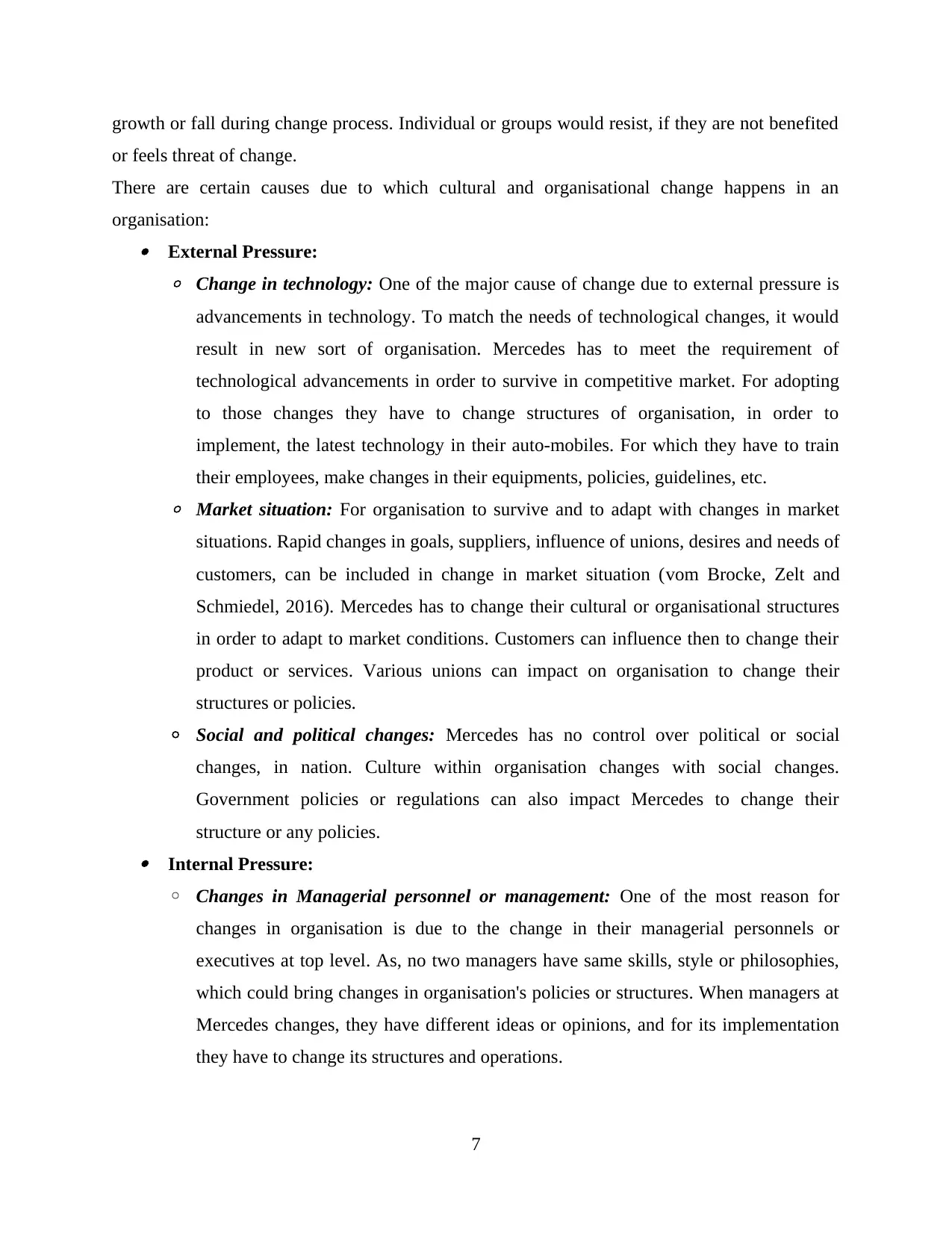
growth or fall during change process. Individual or groups would resist, if they are not benefited
or feels threat of change.
There are certain causes due to which cultural and organisational change happens in an
organisation: External Pressure:
◦ Change in technology: One of the major cause of change due to external pressure is
advancements in technology. To match the needs of technological changes, it would
result in new sort of organisation. Mercedes has to meet the requirement of
technological advancements in order to survive in competitive market. For adopting
to those changes they have to change structures of organisation, in order to
implement, the latest technology in their auto-mobiles. For which they have to train
their employees, make changes in their equipments, policies, guidelines, etc.
◦ Market situation: For organisation to survive and to adapt with changes in market
situations. Rapid changes in goals, suppliers, influence of unions, desires and needs of
customers, can be included in change in market situation (vom Brocke, Zelt and
Schmiedel, 2016). Mercedes has to change their cultural or organisational structures
in order to adapt to market conditions. Customers can influence then to change their
product or services. Various unions can impact on organisation to change their
structures or policies.
◦ Social and political changes: Mercedes has no control over political or social
changes, in nation. Culture within organisation changes with social changes.
Government policies or regulations can also impact Mercedes to change their
structure or any policies. Internal Pressure:
◦ Changes in Managerial personnel or management: One of the most reason for
changes in organisation is due to the change in their managerial personnels or
executives at top level. As, no two managers have same skills, style or philosophies,
which could bring changes in organisation's policies or structures. When managers at
Mercedes changes, they have different ideas or opinions, and for its implementation
they have to change its structures and operations.
7
or feels threat of change.
There are certain causes due to which cultural and organisational change happens in an
organisation: External Pressure:
◦ Change in technology: One of the major cause of change due to external pressure is
advancements in technology. To match the needs of technological changes, it would
result in new sort of organisation. Mercedes has to meet the requirement of
technological advancements in order to survive in competitive market. For adopting
to those changes they have to change structures of organisation, in order to
implement, the latest technology in their auto-mobiles. For which they have to train
their employees, make changes in their equipments, policies, guidelines, etc.
◦ Market situation: For organisation to survive and to adapt with changes in market
situations. Rapid changes in goals, suppliers, influence of unions, desires and needs of
customers, can be included in change in market situation (vom Brocke, Zelt and
Schmiedel, 2016). Mercedes has to change their cultural or organisational structures
in order to adapt to market conditions. Customers can influence then to change their
product or services. Various unions can impact on organisation to change their
structures or policies.
◦ Social and political changes: Mercedes has no control over political or social
changes, in nation. Culture within organisation changes with social changes.
Government policies or regulations can also impact Mercedes to change their
structure or any policies. Internal Pressure:
◦ Changes in Managerial personnel or management: One of the most reason for
changes in organisation is due to the change in their managerial personnels or
executives at top level. As, no two managers have same skills, style or philosophies,
which could bring changes in organisation's policies or structures. When managers at
Mercedes changes, they have different ideas or opinions, and for its implementation
they have to change its structures and operations.
7
Paraphrase This Document
Need a fresh take? Get an instant paraphrase of this document with our AI Paraphraser
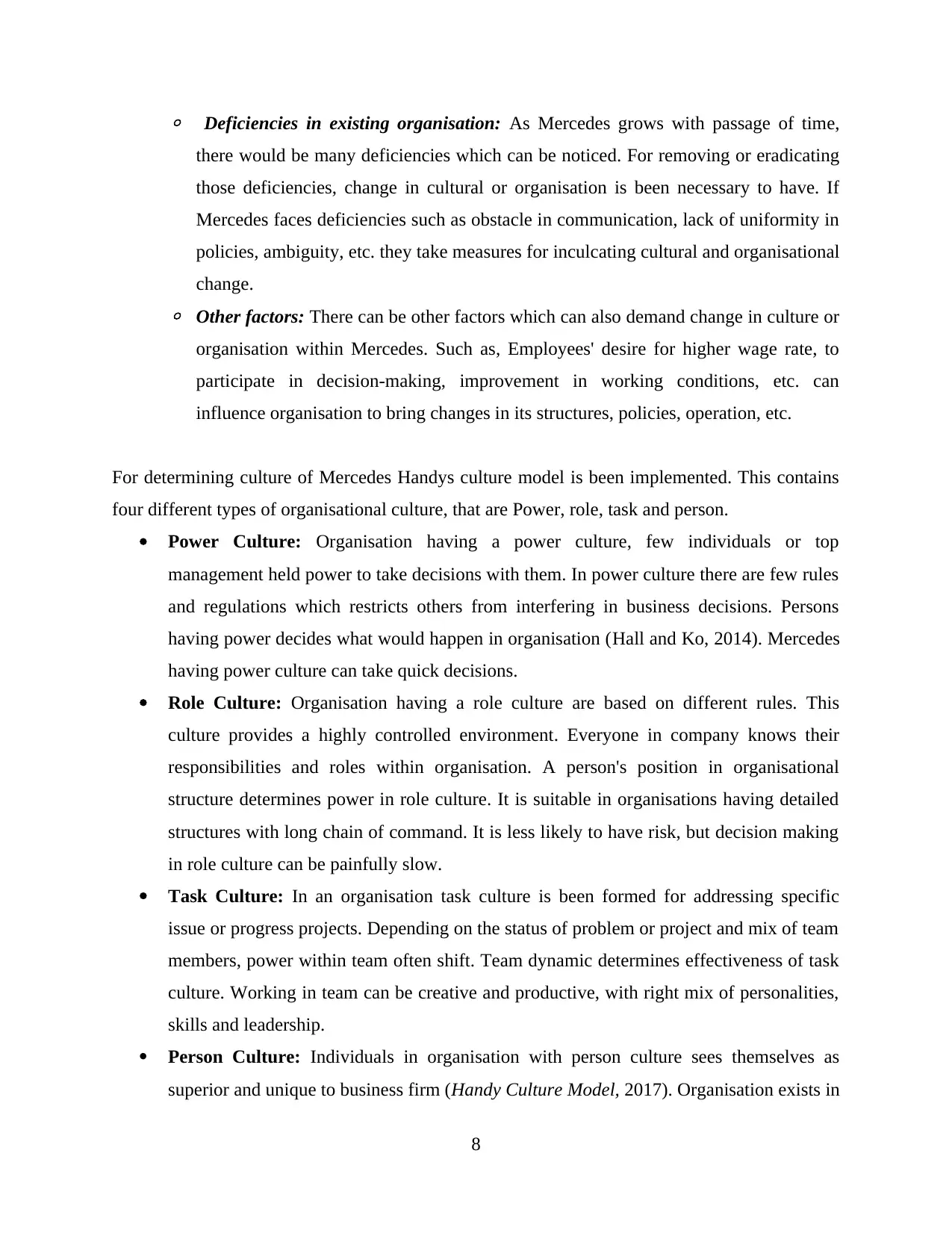
◦ Deficiencies in existing organisation: As Mercedes grows with passage of time,
there would be many deficiencies which can be noticed. For removing or eradicating
those deficiencies, change in cultural or organisation is been necessary to have. If
Mercedes faces deficiencies such as obstacle in communication, lack of uniformity in
policies, ambiguity, etc. they take measures for inculcating cultural and organisational
change.
◦ Other factors: There can be other factors which can also demand change in culture or
organisation within Mercedes. Such as, Employees' desire for higher wage rate, to
participate in decision-making, improvement in working conditions, etc. can
influence organisation to bring changes in its structures, policies, operation, etc.
For determining culture of Mercedes Handys culture model is been implemented. This contains
four different types of organisational culture, that are Power, role, task and person.
Power Culture: Organisation having a power culture, few individuals or top
management held power to take decisions with them. In power culture there are few rules
and regulations which restricts others from interfering in business decisions. Persons
having power decides what would happen in organisation (Hall and Ko, 2014). Mercedes
having power culture can take quick decisions.
Role Culture: Organisation having a role culture are based on different rules. This
culture provides a highly controlled environment. Everyone in company knows their
responsibilities and roles within organisation. A person's position in organisational
structure determines power in role culture. It is suitable in organisations having detailed
structures with long chain of command. It is less likely to have risk, but decision making
in role culture can be painfully slow.
Task Culture: In an organisation task culture is been formed for addressing specific
issue or progress projects. Depending on the status of problem or project and mix of team
members, power within team often shift. Team dynamic determines effectiveness of task
culture. Working in team can be creative and productive, with right mix of personalities,
skills and leadership.
Person Culture: Individuals in organisation with person culture sees themselves as
superior and unique to business firm (Handy Culture Model, 2017). Organisation exists in
8
there would be many deficiencies which can be noticed. For removing or eradicating
those deficiencies, change in cultural or organisation is been necessary to have. If
Mercedes faces deficiencies such as obstacle in communication, lack of uniformity in
policies, ambiguity, etc. they take measures for inculcating cultural and organisational
change.
◦ Other factors: There can be other factors which can also demand change in culture or
organisation within Mercedes. Such as, Employees' desire for higher wage rate, to
participate in decision-making, improvement in working conditions, etc. can
influence organisation to bring changes in its structures, policies, operation, etc.
For determining culture of Mercedes Handys culture model is been implemented. This contains
four different types of organisational culture, that are Power, role, task and person.
Power Culture: Organisation having a power culture, few individuals or top
management held power to take decisions with them. In power culture there are few rules
and regulations which restricts others from interfering in business decisions. Persons
having power decides what would happen in organisation (Hall and Ko, 2014). Mercedes
having power culture can take quick decisions.
Role Culture: Organisation having a role culture are based on different rules. This
culture provides a highly controlled environment. Everyone in company knows their
responsibilities and roles within organisation. A person's position in organisational
structure determines power in role culture. It is suitable in organisations having detailed
structures with long chain of command. It is less likely to have risk, but decision making
in role culture can be painfully slow.
Task Culture: In an organisation task culture is been formed for addressing specific
issue or progress projects. Depending on the status of problem or project and mix of team
members, power within team often shift. Team dynamic determines effectiveness of task
culture. Working in team can be creative and productive, with right mix of personalities,
skills and leadership.
Person Culture: Individuals in organisation with person culture sees themselves as
superior and unique to business firm (Handy Culture Model, 2017). Organisation exists in
8
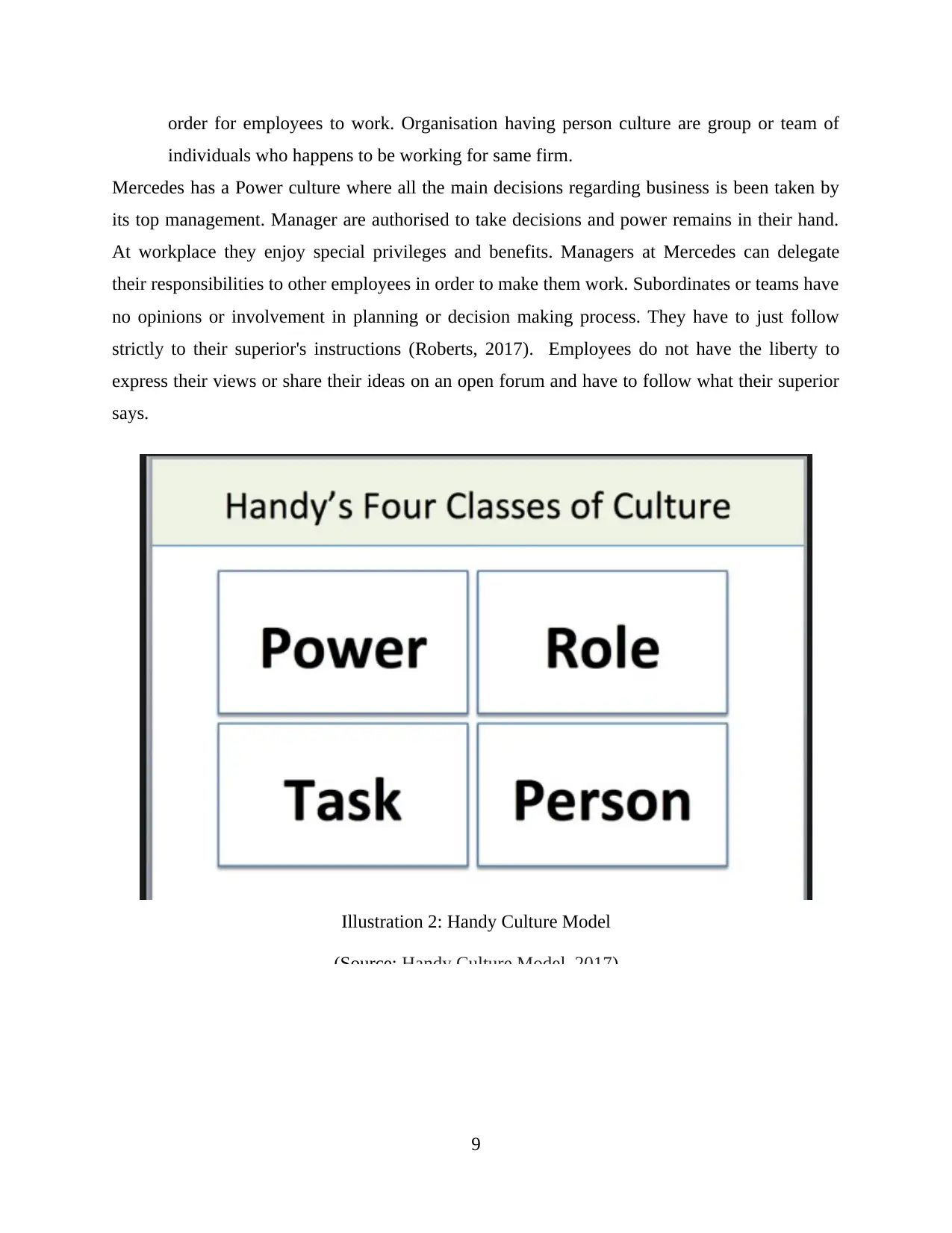
order for employees to work. Organisation having person culture are group or team of
individuals who happens to be working for same firm.
Mercedes has a Power culture where all the main decisions regarding business is been taken by
its top management. Manager are authorised to take decisions and power remains in their hand.
At workplace they enjoy special privileges and benefits. Managers at Mercedes can delegate
their responsibilities to other employees in order to make them work. Subordinates or teams have
no opinions or involvement in planning or decision making process. They have to just follow
strictly to their superior's instructions (Roberts, 2017). Employees do not have the liberty to
express their views or share their ideas on an open forum and have to follow what their superior
says.
9
Illustration 2: Handy Culture Model
(Source: Handy Culture Model, 2017)
individuals who happens to be working for same firm.
Mercedes has a Power culture where all the main decisions regarding business is been taken by
its top management. Manager are authorised to take decisions and power remains in their hand.
At workplace they enjoy special privileges and benefits. Managers at Mercedes can delegate
their responsibilities to other employees in order to make them work. Subordinates or teams have
no opinions or involvement in planning or decision making process. They have to just follow
strictly to their superior's instructions (Roberts, 2017). Employees do not have the liberty to
express their views or share their ideas on an open forum and have to follow what their superior
says.
9
Illustration 2: Handy Culture Model
(Source: Handy Culture Model, 2017)
⊘ This is a preview!⊘
Do you want full access?
Subscribe today to unlock all pages.

Trusted by 1+ million students worldwide
1 out of 19
Related Documents
Your All-in-One AI-Powered Toolkit for Academic Success.
+13062052269
info@desklib.com
Available 24*7 on WhatsApp / Email
![[object Object]](/_next/static/media/star-bottom.7253800d.svg)
Unlock your academic potential
Copyright © 2020–2025 A2Z Services. All Rights Reserved. Developed and managed by ZUCOL.





